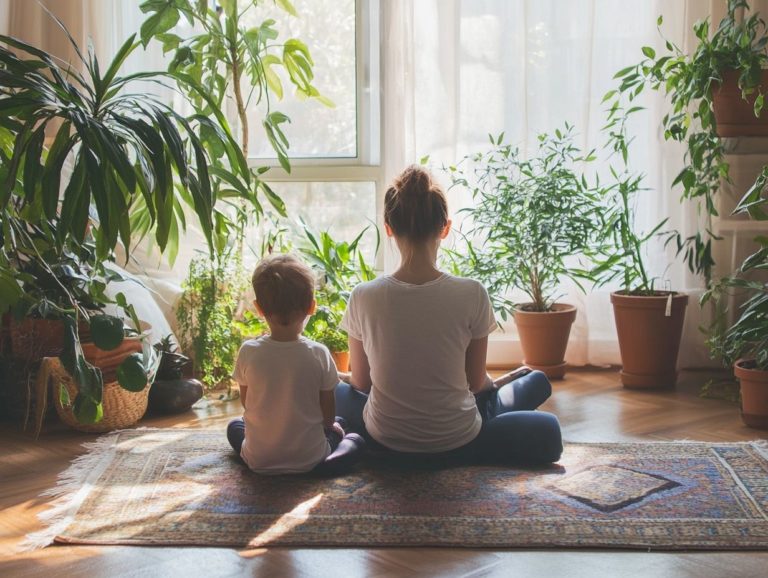Mindfulness Meditation: A Guide for Parents
Parenting is a rewarding yet challenging journey that often brings with it stress, anxiety, and a whirlwind of emotional ups and downs. Modern parenting demands coping strategies that address both the emotional highs and lows as well as the psychological distress that can accompany such responsibilities.
Mindfulness meditation is a powerful tool to help you navigate these challenges, allowing for a calmer and more present approach to raising your children. From reducing stress to enhancing the bond you share with your child, the benefits of mindfulness are truly profound. Integrating meditation techniques into your daily routine can help achieve emotional stability and inner peace.
This exploration delves into how mindfulness meditation can transform your parenting experience. You ll discover practical tips to seamlessly integrate it into your daily life. Techniques to cultivate patience and emotional regulation will be shared, along with strategies to tackle common obstacles that may arise in your mindfulness practice. We ll also discuss coping strategies to reduce stress and anxiety, creating a more peaceful family environment.
Contents
- Key Takeaways:
- Why Is Mindfulness Meditation Beneficial for Parents?
- How to Incorporate Mindfulness Meditation into Parenting?
- What Are Some Mindfulness Meditation Techniques for Parents?
- How Can Parents Overcome Challenges in Practicing Mindfulness Meditation?
- Summary
- Frequently Asked Questions
- What is mindfulness meditation?
- How can mindfulness meditation benefit parents?
- How can parents practice mindfulness meditation?
- Is mindfulness meditation suitable for children?
- Can mindfulness meditation help parents become better caregivers?
- Are there any resources for parents who want to learn more about mindfulness meditation and its benefits?
Key Takeaways:

- Mindfulness meditation helps parents reduce stress and anxiety, promoting a calmer, more present parenting style.
- Practicing mindfulness meditation together with your child strengthens your bond and fosters mutual understanding and patience.
- Incorporating mindful communication techniques and creating a mindful environment enhances the benefits of mindfulness meditation for parents.
Why Is Mindfulness Meditation Beneficial for Parents?
Mindfulness meditation presents a wealth of benefits specifically designed for parents, addressing the distinct challenges that modern parenting entails. In the relentless whirlwind of daily life, busy parents often grapple with elevated stress and anxiety levels. Discovering effective coping strategies is essential.
Integrating mindfulness practices into your routine helps you achieve emotional stability and enhances your mental well-being. It builds resilience to navigate parenting hurdles with greater ease. As the demands of parenting can sometimes feel overwhelming, realizing how powerful meditation can be for you and your family empowers you to prioritize your own self-care. This approach nurtures not only your well-being but also addresses your children’s needs, ensuring that busy parents can manage their time effectively.
1. Reduces Stress and Anxiety
One of the most significant advantages of mindfulness meditation is its remarkable ability to reduce stress and anxiety, making it an invaluable ally for parents navigating the complexities of parenting.
In today s fast-paced environment, the pressures parents face can feel overwhelming, leading to heightened stress levels. Mindfulness meditation techniques like guided meditation and breathing exercises provide practical, effective ways to alleviate that pressure. Research indicates that consistent mindfulness practice can lead to a substantial 30% reduction in perceived stress, with many parents reporting enhanced emotional well-being, greater resilience, and improved heart health.
The secret to achieving lasting benefits lies in consistency. Engaging in daily practice cultivates a deeper sense of awareness and emotional regulation. This not only nurtures a calmer home atmosphere but also sets a powerful example for children, highlighting the importance of self-care in managing life s challenges.
2. Increases Patience and Understanding
Practicing mindfulness meditation can significantly enhance your patience and understanding as a parent, allowing you to respond to your children’s needs with thoughtfulness and empathy. Techniques such as body scan meditation and loving-kindness meditation can be particularly effective in this regard.
Incorporating mindfulness into your daily routine often equips you to better manage the stressors that come with parenting. For example, one mother shared that after dedicating just ten minutes a day to meditation, she found herself feeling more grounded during her toddler’s tantrums, which enabled her to respond with compassion rather than frustration. Another parent discovered that practicing deep breathing techniques gave him the ability to pause before reacting to his children’s behavior, creating a more nurturing atmosphere at home. These examples highlight how practical tips and daily mindfulness can transform the way you approach challenges in parenting.
These anecdotes demonstrate how mindfulness fosters emotional regulation, giving you the power to face parenting challenges with a calm demeanor and a clearer perspective.
3. Improves Emotional Regulation
Mindfulness meditation is essential for you as a parent, playing a pivotal role in enhancing your emotional regulation and providing you with effective tools to navigate the ups and downs of parenthood.
By cultivating greater self-awareness through mindfulness practices, you can respond thoughtfully to challenges instead of reacting impulsively. Techniques like body scan meditation allow you to connect deeply with your physical sensations, promoting relaxation and alleviating stress. Simultaneously, loving-kindness meditation nurtures compassion, encouraging you to extend kindness not only towards yourself but also to your children. These mindfulness techniques also contribute to improved mental health and emotional regulation.
As you regularly engage in these practices, the benefits ripple out beyond just your individual well-being. Your family will experience strengthened emotional bonds as you become calmer, more present, and better equipped to embrace both the joys and stresses that come with raising children.
4. Enhances Parent-Child Bonding
Mindfulness meditation offers more than just individual benefits; it plays a crucial role in enhancing the bond between you and your child, fostering deeper emotional connections and understanding within your family.
This enriching practice encourages open communication and empathy, allowing each family member to express their thoughts and feelings more freely. When you engage in mindfulness activities together, you create a shared sanctuary of tranquility where fears and frustrations can be addressed without judgment. Family meditation sessions can be a great way to foster these connections, enhancing the overall family dynamics.
Consider incorporating guided meditation, deep-breathing exercises, or even mindful walking activities that can be easily adapted for all ages, making it simple to weave them into your daily routines. By dedicating time to these transformative experiences, you cultivate a loving environment where your relationships can thrive and emotional well-being is nurtured.
How to Incorporate Mindfulness Meditation into Parenting?

Incorporating mindfulness meditation into your parenting can be a transformative journey that significantly enhances both your personal well-being and your family dynamics. Utilizing meditation apps like Headspace or Calm can help guide you through this process, making it easier to integrate mindfulness into your busy schedule.
Embracing this practice not only fosters a deeper connection with yourself but also enriches the daily lives of everyone in your family.
1. Start with Small Steps
To successfully weave mindfulness meditation into your parenting routine, start with small, manageable steps that can evolve into a sustainable practice amidst your busy lifestyle. This approach to time management ensures that you can maintain consistency even during the busiest days.
Consider beginning with short sessions of just five to ten minutes. These can easily fit into even the most hectic of schedules. Setting daily reminders on your phone can serve as gentle nudges, prompting you to pause and embrace the present moment.
You ll find many meditation apps with guided sessions for beginners. This makes your transition into mindfulness smooth and inviting. By integrating moments of reflection or breathing exercises into your daily rituals, like savoring your morning coffee or winding down before bedtime, you can enhance your experience. This allows parenting and meditation to harmoniously coexist in your life.
2. Practice Together with Your Child
Practicing mindfulness meditation with your child can truly deepen the bond between you. It fosters a rich emotional connection and a shared experience that both of you can cherish. This practice, often referred to as family meditation, can bring significant benefits to the emotional well-being of both parents and children.
This journey into mindfulness creates a nurturing environment for emotional growth. It also sharpens your child’s communication skills and empathy. Engaging in simple, age-appropriate meditation activities like imagining calm scenarios or breathing exercises can significantly enhance your child’s ability to manage stress and express emotions in a healthy way.
Incorporating enjoyable mindfulness exercises, such as mindful walking or coloring mandalas, allows your child to tap into their creativity while remaining anchored in the present moment. After each session, sharing feelings encourages open dialogue, creating a safe space for your child to articulate their thoughts and fears. This can also help in managing conditions like IBS, colitis, and insomnia by reducing overall stress levels.
This process ultimately leads to greater emotional resilience. It equips them with the tools they need to navigate life’s challenges. This resilience can also contribute to improved mental health and a stronger sense of inner peace.
3. Create a Mindful Environment
Creating a mindful environment at home is essential for cultivating a culture of mindfulness and emotional balance for you and your family. This approach to mindful awareness also promotes psychological well-being, making it easier to cope with the emotional ups and downs of daily life.
By intentionally decluttering your living space, you can remove distractions that may disrupt your meditation practices. Setting aside a specific time each day for reflection and mindfulness helps establish a routine, making it easier for everyone to engage in this practice regularly. This can also aid in psychological well-being and help reduce psychological distress.
Incorporating soothing scents like lavender or sandalwood, whether through essential oils or incense, can elevate the atmosphere. This invites a sense of tranquility into your home. This serene environment not only deepens your mindfulness experience but also plays a significant role in reducing stress levels, enabling you and your children to navigate daily challenges with greater ease and clarity.
Practicing mindfulness in such an environment can improve your overall mental well-being and foster a more peaceful atmosphere at home.
4. Use Mindful Communication Techniques
Embracing mindful communication techniques can significantly elevate your interactions with your child, nurturing a deeper understanding and fostering emotional regulation.
Incorporating strategies such as active listening and being fully present during conversations cultivates an environment that encourages openness and connection. For instance, when your child shares their feelings about a tough day at school, a mindful approach means focusing entirely on their words. Set aside distractions like phones or the television. This practice shows you truly understand their feelings, making them feel valued.
Reflecting back what your child has expressed strengthens this connection. It paves the way for deeper conversations that promote both emotional growth and mutual understanding.
What Are Some Mindfulness Meditation Techniques for Parents?
Mindfulness meditation offers a range of techniques that elevate mental well-being, reduce stress, and help parents navigate challenges with greater ease. Incorporating these techniques into your daily routine provides numerous benefits, including improved emotional balance and relaxation.
1. Breathing Exercises

Breathing exercises are essential mindfulness techniques. They help you achieve immediate stress reduction, anxiety relief, and relaxation amidst your busy life. These exercises are practical tips that busy parents can easily integrate into their daily routines.
Incorporating practices like deep breathing and breathing deeply using your diaphragm enhances heart health and physical well-being. They also significantly improve mental health and emotional regulation. Dedicating just a few minutes each day to focus on your breath taking deep inhalations and exhalations can reduce anxiety, increase feelings of calm, and sharpen your focus.
Make it a priority to set aside time during your morning rituals or at the end of the day to create a dedicated calm space. Start with a simple exercise: inhale deeply through your nose, hold for a count of four, and then exhale slowly. Practicing deep breathing while lying down or seated helps you become more attuned to your breath, fostering a greater sense of peace and stability in your emotions.
2. Body Scan Meditation
Body scan meditation is a powerful mindfulness technique that integrates well into your daily routine. This method cultivates relaxation and emotional balance through focused awareness of your body.
Directing your attention to various parts of your body helps identify tension or discomfort that often goes unnoticed amid the hustle of daily life. This practice fosters a deep connection with your physical presence, allowing stress to melt away and emotions to be gently acknowledged and processed.
You ll find a wealth of guided experiences online, including audio recordings and mobile apps tailored for body scan meditation. These resources offer step-by-step instructions and establish a serene atmosphere that enhances your overall experience, making them essential tools for emotional regulation as you navigate parenting challenges.
3. Loving-Kindness Meditation
Loving-kindness meditation is a powerful practice inviting you to cultivate compassion and emotional connection towards yourself and your children. Embracing a mindset of love and acceptance transforms interactions and fosters a deeper understanding of your children’s needs and emotions. This technique is highly beneficial for mindful parenting and nurturing family relationships.
This meditation technique, rooted in Buddhist traditions, encourages you to repeat phrases that promote goodwill and kindness. To get started, find a quiet space where you can sit comfortably. Take a few deep breaths to center yourself. Practicing loving-kindness enhances overall mental well-being and helps deal with parenting challenges more effectively.
Begin by extending wishes of happiness, health, and safety to yourself. Gradually direct those heartfelt intentions towards your children, partner, and others in your community. Over time, you may notice significant improvements in your empathy and patience, paving the way for more nurturing and harmonious family relationships.
4. Mindful Walking
Mindful walking merges physical activity with mindfulness, offering you the chance to experience relaxation and emotional balance through a simple, everyday task. This practice invites you to focus on your breathing, feel your feet make contact with the ground, and absorb the sights and sounds around you. As you engage in this practice, you foster a deeper connection with the present moment and with yourself.
Mindful walking is an excellent way to integrate mindfulness into your daily life and enhance your overall wellness.
To practice mindful walking effectively, begin by selecting a serene environment be it a tranquil park or a peaceful street and set a clear intention for your walk. During this time, concentrate on your steps, the rhythm of your breath, and any thoughts that arise. Acknowledge these thoughts, allowing them to drift away without judgment. This practice can be a form of self-care, helping you find peace and clarity while managing parenting duties.
This technique not only cuts down on stress it’s a boost for your mental well-being!
How Can Parents Overcome Challenges in Practicing Mindfulness Meditation?
Engaging in mindfulness meditation as a parent presents its own unique challenges, but overcoming these challenges is essential for fully embracing the benefits that meditation has to offer. Practicing mindfulness can help parents find coping strategies to manage stress and improve their mental well-being.
1. Finding Time for Meditation
Finding time for meditation can feel like a daunting challenge for busy parents, but incorporating small moments of mindfulness into your daily routine is a highly achievable solution. Setting aside just a few minutes in the early morning can set a tranquil tone for your day, allowing you to center yourself before the inevitable whirlwind of family life begins.
Alternatively, those precious nap times can serve as the ideal opportunity for brief meditation sessions, giving you a mental reset without adding stress to your already packed schedule. This method helps manage anxiety and improve your wellness.
Meditation apps can be a game changer; they often provide guided sessions tailored to fit various time constraints and experience levels. This makes it simple for you to weave mindfulness practices into your day whenever you can snag a moment, whether that s during a lunch break or while you re waiting for your kids’ activities to wrap up.
2. Dealing with Distractions

Dealing with distractions is a common hurdle for you as a parent when practicing mindfulness meditation. Use techniques to improve your focus. This can make your experience much better. Calming techniques such as using noise-cancelling headphones or creating a peaceful meditation space can be highly beneficial.
Creating a dedicated meditation space can truly be transformative; imagine a quiet corner, free from the usual daily chaos, allowing for deeper immersion into your practice. Using noise-cancelling headphones can effectively block out external sounds, enabling a tranquil environment that is perfect for mindfulness.
Over time, as you continue to practice, you may discover that cultivating mindfulness fosters an increased ability to concentrate, helping to transform your meditation into a more rewarding and consistent part of your daily life. These strategies not only enrich your meditation experience but can also seep into your everyday interactions, promoting a greater sense of calm and awareness.
Summary
Incorporating mindful walking and effective meditation techniques into your routine can significantly enhance your parenting experience. By overcoming challenges and utilizing practical tools, you can embed mindfulness into your daily life, leading to reduced stress and increased well-being.
3. Letting Go of Expectations
Letting go of expectations is essential when practicing mindfulness meditation. This is especially true for parents who often feel the weight of specific outcomes pressing down on them.
By embracing a mindset that prioritizes the journey over the destination, you can cultivate a deeper emotional balance within yourself and your family. When you recognize that mindfulness is less about striving for perfection and more about being present, you empower yourself to navigate daily stressors with admirable grace. This acceptance fosters personal reflection and helps you respond thoughtfully to challenges.
This acceptance can transform how you approach challenges, enabling you to respond thoughtfully instead of reacting impulsively. By embodying this attitude, you naturally impart the values of resilience and patience to your children, fostering a nurturing environment where everyone feels supported and understood. Understanding the benefits of meditation helps in developing coping strategies for daily life.
Frequently Asked Questions
What is mindfulness meditation?
Mindfulness meditation is a technique that involves focusing on the present moment and being aware of your thoughts, feelings, and surroundings without judgment.
How can mindfulness meditation benefit parents?
Mindfulness meditation can help parents reduce stress, improve their ability to manage emotions, increase empathy and compassion, and enhance overall well-being. It also offers practical tips for managing psychological distress and achieving inner peace.
How can parents practice mindfulness meditation?
Parents can practice mindfulness meditation by finding a quiet and comfortable space and focusing on their breath or a specific object. It’s important to gently bring their attention back whenever their mind wanders. Incorporating breathing exercises like deep breathing can enhance the effectiveness of your meditation practice.
Is mindfulness meditation suitable for children?
Yes, mindfulness meditation can be beneficial for children as it can help them manage their emotions, improve focus and attention, and develop empathy and compassion. Family meditation sessions can foster a shared sense of calm and emotional balance.
Can mindfulness meditation help parents become better caregivers?
Absolutely! Practicing mindfulness can significantly improve a parent’s ability to care for their children by enhancing their emotional management and patience. It helps parents be more present, focus on their children’s needs, reduce stress and anxiety, and promote emotional balance, leading to a stronger connection with their children.
Are there any resources for parents who want to learn more about mindfulness meditation and its benefits?
Yes, there are many resources available, including books, apps, and online courses, that can teach parents about mindfulness meditation and provide practical tips on how to incorporate it into their daily routine.
Popular meditation apps like Headspace and Calm, along with techniques like body scan meditation and guided meditation, can help parents manage stress and improve their mental health. Additionally, resources such as Annette Benedetti’s guides on modern parenting offer insights into coping strategies, emotional regulation, and nurturing relationships.






